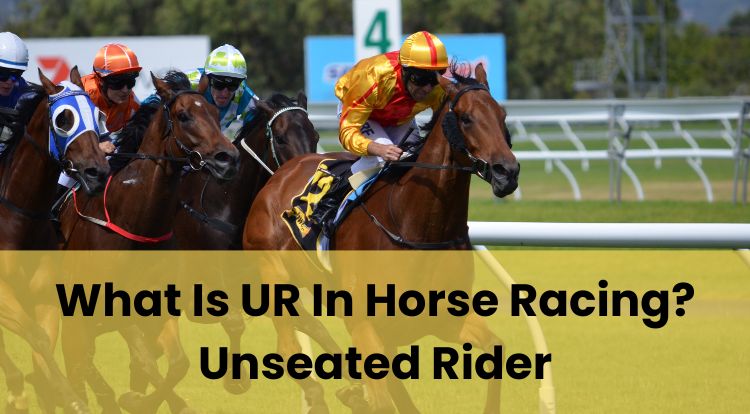
Watching horse racing can be exciting, but it comes with its own set of terms that might be confusing at first. One of these terms is "UR", which stands for "Unseated Rider".
When you see "UR" next to a horse's name in the race results, it means the jockey has fallen off the horse during the race. This can happen for many reasons, such as the horse stumbling or being unsettled.
Understanding these terms can make watching and enjoying horse racing more enjoyable, so let's dive a bit deeper into what happens when a rider is unseated and how it affects the results of the race and any bets.
UR In Horse Racing Meaning
In horse racing, the term "UR" stands for "Unseated Rider". This means the jockey has fallen off the horse during the race.
The unseating can happen at any point, from the starting line to the finish. Often, it might be caused by the horse tripping, getting startled, or making a sudden movement.
When a jockey is unseated, it doesn't automatically mean the horse is injured. However, both the jockey and horse receive immediate attention to ensure they are okay.
The horse typically continues running after the jockey falls off, although it is no longer part of the race. Safety measures are in place to help guide the unseated horse off the track to avoid accidents.
Understanding the term "UR" helps you comprehend race results better. It gives you insight into why a particular horse didn't finish the race or its official standing.
Do You Get Money Back If Your Rider Is Unseated?
If you've placed a bet on a horse and the rider gets unseated, you might wonder if you can get your money back.
In most cases, the answer is no. Once the race begins, bets are typically considered final. If the rider is unseated, it's viewed as part of the risk of betting on horse racing.
However, some bookmakers do offer special promotions or concessions. These can include money-back offers or free bets if your horse's rider is unseated. It's always a good idea to check the terms and conditions of the bookmaker before placing your bet, but these are exceptions rather than the norm.
Additionally, if there's a major incident and the race is voided, you may receive a refund, but this is quite rare.
Remember, betting should always be done responsibly. Only bet money you can afford to lose, and make sure to enjoy the sport for its excitement, not just the potential for a win.
What If a Horse Wins Without a Jockey?
If a horse continues running and crosses the finish line first without a jockey, it won't be declared the winner.
In horse racing, a jockey must guide and stay on the horse for the entire race to count. Without a jockey, the horse is considered riderless and disqualified from the race. This rule ensures the safety and fairness of the sport.
So, even if a riderless horse finishes before any other, the race officials will not count it in the final standings. The first horse with a jockey still on to pass the finish will be considered as holding the winning place.
It's important to know this when watching races or placing bets, as it clarifies why the horse you backed might not appear in the results if the jockey was unseated. Always stay informed and enjoy the excitement of horse racing and betting responsibly.
Do Jockeys Fall Often?
Falling is an unfortunate part of horse racing, but it doesn't happen all the time.
Jockeys are highly skilled and undergo extensive training to stay balanced and control their horses, even at high speeds. Despite this, the nature of the sport means accidents can occur.
Several factors can lead to a jockey being unseated. The horse might stumble, be spooked, or make a sudden move, causing the rider to lose their balance. Weather conditions and the state of the track can also play a role.
Racing authorities take safety very seriously. Courses are designed with safety measures in place, and medical teams are always on standby during races.
It's important to remember that while falls can occur, they are relatively rare compared to the number of races held. Jockeys and horses are well cared for, and protocols ensure their well-being is a priority.
